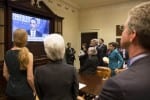Margaret Thatcher and Tony Blair were two of the most powerful Prime Ministers of recent times. Both led their parties to three general election victories with substantial majorities, and neither was defeated at the ballot box. Yet both were arguably to some degree forced from office by factors beyond their control. While Blair would probably claim that he left office at a time of his choosing, this is a moot point, Thatcher certainly did not want to leave. Their careers offer some interesting perspectives on the nature and vulnerabilities of the Prime Minister, which both have have reflected on in their memoirs. Thatcher, clearly bitter at the manner of her departure, emphasises the important of keeping the support of the Cabinet:
Though I had never been defeated in a general election, retained the support of the Party in the country, and had just won the support of a majority of the Party in Parliament… I had lost the Cabinet’s support. I could not even muster a credible campaign team. It was the end.
Margaret Thatcher, The Downing Street Years, pp.849, 855.
Her comments are echoed in this, somewhat longer, explanation by the former Cabinet Secretary, Richard Wilson:
You may have times, as we had times, when prime ministers have been so strong that their colleagues accepted anything they wanted to do; they had a parliamentary back bench which was supportive of whatever they did; public opinion was happy; the economy was going well. Their ability to get their way was therefore unparalleled, but that does not alter the fundamental fact that if circumstances are different and a prime minister is in a weak position, his cabinet colleagues are debating the issues strongly, it is not possible for the prime minister to have his way and we are not in a country where the prime minister is a president and can just say “This is what happens and this is what goes.” We are always fundamentally in a position where if cabinet ministers wish to assert themselves then the power of the prime minister will be checked and balanced in that way.
Sir Richard Wilson, Cabinet Secretary 1998-2002, quoted in Jones and Norton, The New British Politics, 7th ed., p.398.
Another former Conservative Prime Minister, Harold Macmillan, is widely claimed to have replied to a question from a journalist about what he feared most with the comment, ‘events, dear boy, events.’ Although it is not clear whether Macmillan ever actually said this, the point is nevertheless well made. In this interesting extract from Blair’s memoirs, he points out that it is not so much the events as when they occur that matters, which to some extent reflects the comments of Richard Wilson above. In his early years Blair rode out some storms, notably over formula 1 and tobacco advertising, which could have been much more damaging had they fallen later in the electoral cycle:
The difference between beginning and end is not – major crises like war excepted – simply in the nature of the events themselves. In other words, an event – let’s say a scandal – can occur at the start, and because everyone is still in the throes of excitement at the new government it can be overcome reasonably easily. If it occurs later, it can be terminal. It depends less on the nature of the events than on their place in the cycle. The adversity, the intensity of the criticism, the fullness of the attack grow not in proportion to the decisions of leadership but rather to the chipping away over time of its freshness, its appeal, its novelty and thus its persuasive power.
Tony Blair (2010), A Journey, London: Hutchinson, p.123.
The lack of control over external factors is to some extent the product of the tendency on the part of recent governments, notably but not only the Blair governments, to give power away, to Europe, the devolved assemblies, the Bank of England and so on. A number of commentators have pointed to his ‘hollowing out’ of the state as being a contributory factor in the decline in public support for politicians and falling electoral turnout, on the grounds that why vote for someone if they don’t have the power to make a difference? This is a particular problem for local government, but also for national politicians, although they are of course complicit in this, as is illustrated in this quote from the former Labour Secretary of State for Constitutional Affairs, Lord Falconer.
What governs our approach is a clear desire to place power where it should be: increasingly not with politicians, but with those best fitted in different ways to deploy it. Interest rates are not set by politicians in the Treasury, but by the bank of England. Minimum wages are not determined by the Department of Trade and Industry, but by the Low Pay Commission. Membership of the House of Lords will be determined not in Downing Street but in an independent Appointments Commission. This depoliticising of key decision-making is a vital element in bringing power closer to the people.
Lord Falconer, Secretary of State for Constitutional Affairs, 2003, quoted in C. Hay (2007), Why We Hate Politics. Cambridge, Polity, p.93.

